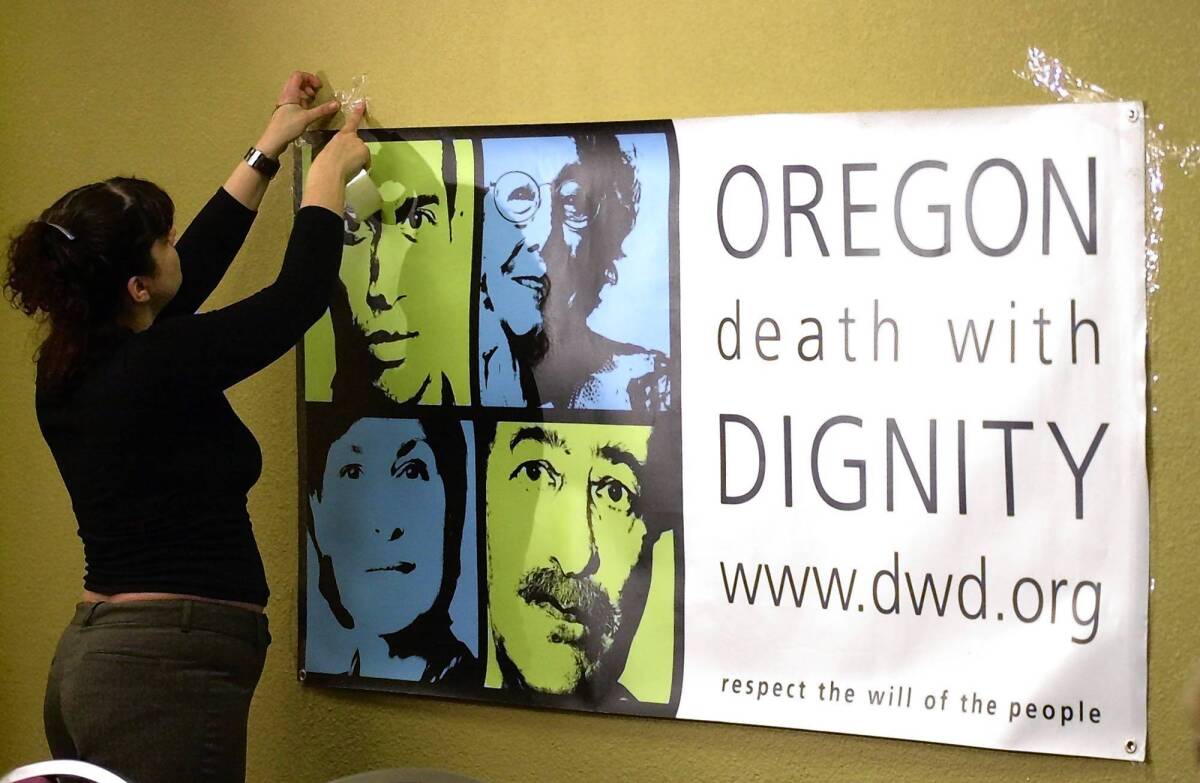When life isn’t living

- Share via
Most of the mail that crosses my desk deals with politics, policy and other largely impersonal subjects. Occasionally, readers will tell their own deeply personal stories as a way to inform a discussion. Several did just that in response to Steve Lopez’s column Wednesday about the prosecution of a Philadelphia nurse accused of helping her ill 93-year-old father end his life.
We heard from doctors, but most poignant were the letters from spouses of terminally ill patients who were confronted with grave end-of-life decisions. Stories like theirs are central to the debate on assisted suicide.
-- Paul Thornton, letters editor
Janice Laine of Seal Beach on her husband:
“My husband was in hospice for more than a year with severe breathing and cardiac problems. The last few weeks of his life, he was bedridden. He could not see or hear.
“I was allowed to give him a few drops of morphine occasionally, but if I gave him the whole bottle, I could have been arrested. Instead, the doctor told me to stop all food and water so he could die ‘naturally’ — in other words, he would starve.
“Giving a lethal dose of morphine is homicide, but it’s OK to starve a helpless person to death. That’s what many of us can look forward to.”
Westlake resident Jefferson C. Romney on his wife:
“Lopez mentions a proposal that would require terminal patients to self-administer drugs prescribed to end their lives. What happens when a person is incapable of doing that?
“My wife of more than 40 years fell last Christmas Eve and broke her neck. Previously a very active person, the fall rendered my wife a quadriplegic and on life support. Her mind was still very alive.
“After several weeks in the hospital, her kidneys began to fail and she was put on dialysis. Several rounds of dialysis later, she had no hope of improving and told me she wanted to die. Thank God that it was her wish to end her misery, but she was unable to administer a drug herself. Fortunately, her life was ended by a nurse removing her breathing tube (after the appropriate paperwork was completed to enable that to happen).
“Had a doctor provided her drugs to end her life, she would not have been able to administer them herself, despite her wish to die.”
Physician Gene Dorio of Santa Clarita disagrees with the AMA on assisted suicide:
“As a geriatric physician, I differ in my view from the American Medical Assn. on physician-assisted suicide. Certainly, doctors are supposed to heal, but medically guiding my patients includes end-of-life care.
“This decision is inherent in our right as human beings, but it now must be written into law, which is not easy. Eventually, the AMA might recognize another compassionate way physicians maintain the rights and dignity of their patients.
“Personally, when it is my turn to make that decistion, I want that right to extend my antecubital vein and ask for another Dr. Kevorkian.”
ALSO:
Letters: Put country before politics
Letters: Keeping it real in Santa Monica
More to Read
A cure for the common opinion
Get thought-provoking perspectives with our weekly newsletter.
You may occasionally receive promotional content from the Los Angeles Times.






